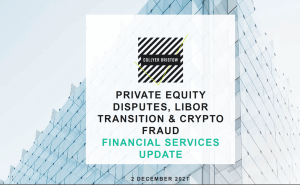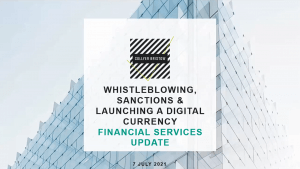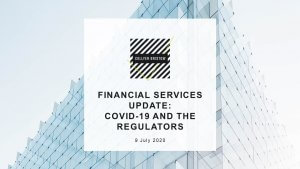- Commercial disputes
- Financial services

Longer Reads
Disputes risks for FS firms: ‘greenwashing’ and ESG reporting obligations
What are the risks for Financial Services firms when improving their ESG initiatives?
7 minute read
Published 13 October 2021
Key information
- Specialisms
- Dispute Resolution
Companies are increasingly feeling the pressure of mounting public interest in Environmental, Social and Governance (ESG) issues. Financial services firms are no exception and in fact find themselves at the epicentre. ESG concerns are wide-ranging, spanning climate change, diversity and modern slavery, amongst other things. This public interest has resulted in financial services firms increasingly focusing on “sustainable” and ESG-compliant funds and other products. In fact, PwC has forecasted that ESG funds will outnumber conventional funds by 2025.
There is a significant opportunity for firms to expand their offering of ESG compliant products to meet the increase in demand. However, responsible firms might be entering an uneven playing field.
The lack of clarity caused by the absence of any clear market definition of what constitutes a “green” or “ESG-compliant” investment could be exploited by some firms, by exaggerating or misrepresenting the ESG credentials of an investment or product. This is known as “greenwashing”. Attempts to define these concepts are disjointed and there is a significant amount of inconsistency, with some funds being labelled “ESG” purely on the basis of applying exclusion criteria (such as excluding tobacco and arms), whilst still including major carbon producing investments such as fossil fuels.
Recently, one of Europe’s largest asset managers, Legal & General Investment Management, faced greenwashing allegations (which they deny) in relation to a fund investing in securities issued by entities that are wholly Chinese government-owned. It was alleged that such investments could not be in line with corporate sustainability principles, including protection of human rights, labour market standards, and environmental standards.
The financial services industry is not the only sector that faces allegations of greenwashing. Last year, environmental law charity, ClientEarth, filed an OECD complaint against oil and gas giant, BP, alleging it misled the public in an advertising campaign that lauded its eco-efforts. The campaign focused on its low carbon energy products and ignored the fact that 96% of its annual spending was on oil and gas. BP terminated the advertising campaign before the complaint was heard. However, the UK National Contact Point for the OECD Guidelines for Multinational Enterprises accepted that the issue was “material and substantiated”, setting a precedent for future actions on misleading greenwashing campaigns.
Financial services firms can expect to face increasing scrutiny and challenges on the ESG-credentials of so-called “green” investments. Therefore, great care must be taken when marketing investments as such. Otherwise, there is a high risk of negative publicity, FOS action or even litigation. In addition, like many other businesses, financial services firms themselves will have obligations, and increasingly a commercial interest, in reporting on their own ESG compliance. In a market that is increasingly focused on ESG issues, and with those issues playing an increasing role in decision-making, there are benefits to this. However, care must be taken to ensure statements are accurate and can be defended, otherwise, they can lead to critical damage. Organisations subject to climate disclosure obligations, in particular, should have robust processes in place to ensure that information is accurate and not misleading, and to be ready for scrutiny should they be challenged.
Disclosure obligations
There are a number of obligations on most UK companies and firms to disclose ESG criteria in annual documents, such as the strategic report, directors’ report and annual accounts.
Most UK companies (except those that qualify for the small companies exemption) are under an obligation to publish an annual strategic report. This includes how the directors have had regard to the impact of the company’s operations on the community and the environment. This is a broad statement and does not detail specifically what is required, so companies have a large amount of discretion as to what to include.
Traded companies, banks, authorised insurance companies and companies carrying on insurance market activity with more than 500 employees are also required to include a non-financial information statement in the strategic report, detailing information on environmental protection, social responsibility and treatment of employees.
Furthermore, large unquoted companies and large limited liability partnerships must also report on their greenhouse gas (GHG) emissions and energy consumption in the directors’ report. For these purposes, ‘large’ means two or more of the following criteria must be met: the company has i) a turnover of £36 million or more; ii) a balance sheet of £18 million or more, iii) 250 or more employees.
Premium listed companies (as defined by the Listing Rules, including equity shares of commercial companies, closed-ended investment funds and open-ended investment companies) are also under an obligation to confirm whether they have made climate-related disclosures in accordance with the recommendations of the TCFD (Task Force on Climate-Related Financial Disclosures). Guidance is given on how the recommendations may be applied and specific supplemental guidance is given to companies in the financial sector.
There are two current FCA consultations on similar requirements being extended to issuers of various standard listed equity shares (i.e. shares other than premium listed shares) and to asset managers, life insurers and FCA regulated pension providers.
Through these various routes, many companies are required to disclose information relating to environmental concerns and considerations. Particularly in the regulated financial services sector, the trend is clearly towards increasingly onerous disclosure obligations in the future which firms must take seriously or face the risk of allegations of misleading statements or greenwashing and potentially enforcement action and complaints.
Litigation
Commercial litigation is becoming a more common route for consumers and organisations focused on ESG issues (particularly climate change) to hold businesses to account. A feature of this, driven by an increasingly sophisticated litigation funding market, is increased group litigation, where a class of interested parties are brought together for the purpose of making a claim.
One route for greenwashing-related litigation is potential claims brought by shareholders in listed financial services firms against the firm itself under sections 90 and 90A of the Financial Services and Markets Act 2000 (FSMA). The former applies in relation to information published in listing particulars or the prospectus. The latter applies to certain published information, such as annual reports and accounts. Due to the increasing statutory and regulatory disclosure requirements ESG credentials and compliance information has become more prominent within the publications falling within the ambit of these claims.
For a claim to be brought under section 90 or 90A of FSMA, the shareholder must have acquired, continued to hold or disposed of shares in reliance upon the published information containing the untrue or misleading statement. Furthermore, a ‘person discharging managerial responsibility’ (PDMR), must have known of or been reckless as to whether the statement was untrue or misleading. The claim must be based on a loss suffered by the shareholder as a result of the untrue or misleading statement. So, in this context, it is difficult to see how merely finding a discrepancy between the company’s claimed ESG credentials and the reality would be likely to lead to a claim (although there is increasing focus on this on the regulatory side). There must be a loss to the shareholder, typically following from a drop in the share price which the shareholder says they would not have suffered absent the untrue or misleading statement. This makes claims more likely where there has been a scandal, fine, litigation or other serious financial consequence arising from practices not in compliance with the company’s ESG policies or credentials as presented to potential and existing shareholders.
These causes of action have been rarely used and no such claim has yet gone all the way to trial. As a result, there are certain unanswered questions, including whether the investor must have actually read the published information. One requirement that poses particular difficulty for a would-be claimant is that the ‘dealing’ in the shares must have been in reliance upon the published information. In a greenwashing claim this requirement may more easily be satisfied as an ESG-conscious investor will likely have their ESG objectives documented. Therefore, future claims are expected and they may set a precedent that opens up this avenue as a more common route for claims in the future.
Companies making ESG disclosures will take comfort, however, from the fact that the liability for issuers in connection with published information is limited to circumstances where a PDMR knew or was reckless to whether the statement was untrue or misleading or had knowledge that the omission was a dishonest concealment of a material fact. Similarly, a person responsible for listing particulars is only liable for a statement made in listing particulars or the prospectus where they reasonably believed (having made such enquires as reasonable) that the statement was true and not misleading or where the omission was properly omitted (provided certain conditions are met).
Of course, the trend towards ESG-related litigation is not limited to the UK. In Germany, proceedings were threatened against DekaBank for misleading retail investors over the social and environmental impact of funds. The bank used an ‘impact calculator’, which quantified the impact of the fund. However, the calculator was only based on an estimate (not evidence) and did not take all the companies in the fund into account. The bank denied any allegation of wrongdoing, but the threat of proceedings in itself causes reputational damage and similar threats of legal action, or even issued claims, are becoming more commonplace. Similar litigation is likely in other jurisdictions including in the UK. The English Commercial Court’s Financial List may be a useful forum for such cases given its specific provision for “test cases” in relation to novel issues important to the financial markets. Again, in England such litigation is more likely where a problem has arisen somewhere within the fund’s portfolio causing loss to investors that would not have occurred had the fund complied with what the investors were led to believe was its position on ESG issues.
If disputes arise between investor and investment manager about the ESG credentials of certain investments / funds, the investor will need to demonstrate it has suffered a loss in order to bring a claim. This might be difficult where the allegedly “greenwashed” investment / fund has performed well financially. However, investment managers should not assume that as long as their funds perform well, no claims will follow. There are other ways that the investor may suffer a loss. For example, clients running environmental campaigns may suffer reputational damage if it comes to light that, despite attempts to invest “green”, they have in fact been invested in (for example) fossil fuels. It may be possible to quantify this reputational damage and, depending on the terms of the investment mandate, the client may turn to its investment manager for redress.
FCA actions for inaccurate disclosures and misleading marketing
Financial services firms should also be conscious of the risk of FCA action, as greenwashing looks set to be high up on its agenda in the near future. The regulator has demonstrated concern that efforts to move towards more sustainable funds may be diluted, and customer confidence undermined, by funds making untrue or misleading statements about their compliance with their claimed ESG policies and credentials. In a recent letter to the chairs of authorised fund managers (AFMs), the FCA provides a set of guiding principles to explain its expectations in relation to the design, delivery and disclosure of ESG and sustainable investment funds. Its aim is to assist AFMs in complying with requirements to accurately disclose the fund’s responsible or sustainable investment strategy.
The House of Commons Treasury Committee has stated that it is aware of the need to ensure that the FCA has the necessary remit, powers and priorities to prevent greenwashing of financial products. The Treasury Committee noted that the mis-selling of green products was likely to result in increased regulatory scrutiny and consumer claims, either by litigation or by the Financial Ombudsman Service (FOS).
Whilst the FCA has not yet sanctioned a company over its climate disclosures, it has recently been asked by ClientEarth to penalise cruise ship company, Carnival, and takeaway giant, Just Eat, for poor climate disclosures. Both complaints allege that Carnival and JustEat have failed to comply with disclosure obligations by inadequately telling investors of the risk posed by climate change on their business. The complaint against JustEat asserts that no reference is made to climate change in the company’s 2020 financial reporting and risked misleading investors as to its sustainability. JustEat does not recognise these allegations and Carnival has not yet commented.
It will be interesting to see how the FCA approaches cases where no specific financial loss or risk of such can be identified by any misleading of investors regarding ESG issues. That would mark quite a significant shift in the focus of its consumer/investor protection function into the protection not from financial harm but essentially emotional harm of investors finding that they had been misled into inadvertently supporting activities they disapproved of for moral, ethical or environmental reasons.
However, as ESG considerations become a more and more entrenched part of such widespread investment decision making it will become harder and harder to separate these two kinds of harm given the potential for a greenwashing scandal in itself to result in serious financial consequences for investors. It is likely that regulators and courts will be grappling with some complex issues arising from the current ESG surge for some time to come.
To some extent, the risk of greenwashing is the same as the risk of making any other kind of misleading statement about a product, service or fund. Clients or customers who rely on those misleading statements and who suffer loss as a result, will likely have a claim. The ESG area presents particular challenges for financial services firms due to increasing reporting obligations which may lead to unintentional greenwashing. Whilst in general potential claimants may struggle to prove loss if their “greenwashed” investments have performed well, this will not always be the case. Increasing concern amongst the general population for issues including climate change, Black Lives Matter, and #MeToo heightens the potential for reputational damage where a company is discovered to have made troublesome investments. It also means there is likely to be a growing pool of potential claimants keen to hold greenwashers to account. These claimants may make use of the growing trends for group litigation and third-party litigation funding.
Originally written for Global Banking and Finance Review
Related content
Longer Reads
Disputes risks for FS firms: ‘greenwashing’ and ESG reporting obligations
What are the risks for Financial Services firms when improving their ESG initiatives?
Published 13 October 2021
Associated sectors / services
Authors
Companies are increasingly feeling the pressure of mounting public interest in Environmental, Social and Governance (ESG) issues. Financial services firms are no exception and in fact find themselves at the epicentre. ESG concerns are wide-ranging, spanning climate change, diversity and modern slavery, amongst other things. This public interest has resulted in financial services firms increasingly focusing on “sustainable” and ESG-compliant funds and other products. In fact, PwC has forecasted that ESG funds will outnumber conventional funds by 2025.
There is a significant opportunity for firms to expand their offering of ESG compliant products to meet the increase in demand. However, responsible firms might be entering an uneven playing field.
The lack of clarity caused by the absence of any clear market definition of what constitutes a “green” or “ESG-compliant” investment could be exploited by some firms, by exaggerating or misrepresenting the ESG credentials of an investment or product. This is known as “greenwashing”. Attempts to define these concepts are disjointed and there is a significant amount of inconsistency, with some funds being labelled “ESG” purely on the basis of applying exclusion criteria (such as excluding tobacco and arms), whilst still including major carbon producing investments such as fossil fuels.
Recently, one of Europe’s largest asset managers, Legal & General Investment Management, faced greenwashing allegations (which they deny) in relation to a fund investing in securities issued by entities that are wholly Chinese government-owned. It was alleged that such investments could not be in line with corporate sustainability principles, including protection of human rights, labour market standards, and environmental standards.
The financial services industry is not the only sector that faces allegations of greenwashing. Last year, environmental law charity, ClientEarth, filed an OECD complaint against oil and gas giant, BP, alleging it misled the public in an advertising campaign that lauded its eco-efforts. The campaign focused on its low carbon energy products and ignored the fact that 96% of its annual spending was on oil and gas. BP terminated the advertising campaign before the complaint was heard. However, the UK National Contact Point for the OECD Guidelines for Multinational Enterprises accepted that the issue was “material and substantiated”, setting a precedent for future actions on misleading greenwashing campaigns.
Financial services firms can expect to face increasing scrutiny and challenges on the ESG-credentials of so-called “green” investments. Therefore, great care must be taken when marketing investments as such. Otherwise, there is a high risk of negative publicity, FOS action or even litigation. In addition, like many other businesses, financial services firms themselves will have obligations, and increasingly a commercial interest, in reporting on their own ESG compliance. In a market that is increasingly focused on ESG issues, and with those issues playing an increasing role in decision-making, there are benefits to this. However, care must be taken to ensure statements are accurate and can be defended, otherwise, they can lead to critical damage. Organisations subject to climate disclosure obligations, in particular, should have robust processes in place to ensure that information is accurate and not misleading, and to be ready for scrutiny should they be challenged.
Disclosure obligations
There are a number of obligations on most UK companies and firms to disclose ESG criteria in annual documents, such as the strategic report, directors’ report and annual accounts.
Most UK companies (except those that qualify for the small companies exemption) are under an obligation to publish an annual strategic report. This includes how the directors have had regard to the impact of the company’s operations on the community and the environment. This is a broad statement and does not detail specifically what is required, so companies have a large amount of discretion as to what to include.
Traded companies, banks, authorised insurance companies and companies carrying on insurance market activity with more than 500 employees are also required to include a non-financial information statement in the strategic report, detailing information on environmental protection, social responsibility and treatment of employees.
Furthermore, large unquoted companies and large limited liability partnerships must also report on their greenhouse gas (GHG) emissions and energy consumption in the directors’ report. For these purposes, ‘large’ means two or more of the following criteria must be met: the company has i) a turnover of £36 million or more; ii) a balance sheet of £18 million or more, iii) 250 or more employees.
Premium listed companies (as defined by the Listing Rules, including equity shares of commercial companies, closed-ended investment funds and open-ended investment companies) are also under an obligation to confirm whether they have made climate-related disclosures in accordance with the recommendations of the TCFD (Task Force on Climate-Related Financial Disclosures). Guidance is given on how the recommendations may be applied and specific supplemental guidance is given to companies in the financial sector.
There are two current FCA consultations on similar requirements being extended to issuers of various standard listed equity shares (i.e. shares other than premium listed shares) and to asset managers, life insurers and FCA regulated pension providers.
Through these various routes, many companies are required to disclose information relating to environmental concerns and considerations. Particularly in the regulated financial services sector, the trend is clearly towards increasingly onerous disclosure obligations in the future which firms must take seriously or face the risk of allegations of misleading statements or greenwashing and potentially enforcement action and complaints.
Litigation
Commercial litigation is becoming a more common route for consumers and organisations focused on ESG issues (particularly climate change) to hold businesses to account. A feature of this, driven by an increasingly sophisticated litigation funding market, is increased group litigation, where a class of interested parties are brought together for the purpose of making a claim.
One route for greenwashing-related litigation is potential claims brought by shareholders in listed financial services firms against the firm itself under sections 90 and 90A of the Financial Services and Markets Act 2000 (FSMA). The former applies in relation to information published in listing particulars or the prospectus. The latter applies to certain published information, such as annual reports and accounts. Due to the increasing statutory and regulatory disclosure requirements ESG credentials and compliance information has become more prominent within the publications falling within the ambit of these claims.
For a claim to be brought under section 90 or 90A of FSMA, the shareholder must have acquired, continued to hold or disposed of shares in reliance upon the published information containing the untrue or misleading statement. Furthermore, a ‘person discharging managerial responsibility’ (PDMR), must have known of or been reckless as to whether the statement was untrue or misleading. The claim must be based on a loss suffered by the shareholder as a result of the untrue or misleading statement. So, in this context, it is difficult to see how merely finding a discrepancy between the company’s claimed ESG credentials and the reality would be likely to lead to a claim (although there is increasing focus on this on the regulatory side). There must be a loss to the shareholder, typically following from a drop in the share price which the shareholder says they would not have suffered absent the untrue or misleading statement. This makes claims more likely where there has been a scandal, fine, litigation or other serious financial consequence arising from practices not in compliance with the company’s ESG policies or credentials as presented to potential and existing shareholders.
These causes of action have been rarely used and no such claim has yet gone all the way to trial. As a result, there are certain unanswered questions, including whether the investor must have actually read the published information. One requirement that poses particular difficulty for a would-be claimant is that the ‘dealing’ in the shares must have been in reliance upon the published information. In a greenwashing claim this requirement may more easily be satisfied as an ESG-conscious investor will likely have their ESG objectives documented. Therefore, future claims are expected and they may set a precedent that opens up this avenue as a more common route for claims in the future.
Companies making ESG disclosures will take comfort, however, from the fact that the liability for issuers in connection with published information is limited to circumstances where a PDMR knew or was reckless to whether the statement was untrue or misleading or had knowledge that the omission was a dishonest concealment of a material fact. Similarly, a person responsible for listing particulars is only liable for a statement made in listing particulars or the prospectus where they reasonably believed (having made such enquires as reasonable) that the statement was true and not misleading or where the omission was properly omitted (provided certain conditions are met).
Of course, the trend towards ESG-related litigation is not limited to the UK. In Germany, proceedings were threatened against DekaBank for misleading retail investors over the social and environmental impact of funds. The bank used an ‘impact calculator’, which quantified the impact of the fund. However, the calculator was only based on an estimate (not evidence) and did not take all the companies in the fund into account. The bank denied any allegation of wrongdoing, but the threat of proceedings in itself causes reputational damage and similar threats of legal action, or even issued claims, are becoming more commonplace. Similar litigation is likely in other jurisdictions including in the UK. The English Commercial Court’s Financial List may be a useful forum for such cases given its specific provision for “test cases” in relation to novel issues important to the financial markets. Again, in England such litigation is more likely where a problem has arisen somewhere within the fund’s portfolio causing loss to investors that would not have occurred had the fund complied with what the investors were led to believe was its position on ESG issues.
If disputes arise between investor and investment manager about the ESG credentials of certain investments / funds, the investor will need to demonstrate it has suffered a loss in order to bring a claim. This might be difficult where the allegedly “greenwashed” investment / fund has performed well financially. However, investment managers should not assume that as long as their funds perform well, no claims will follow. There are other ways that the investor may suffer a loss. For example, clients running environmental campaigns may suffer reputational damage if it comes to light that, despite attempts to invest “green”, they have in fact been invested in (for example) fossil fuels. It may be possible to quantify this reputational damage and, depending on the terms of the investment mandate, the client may turn to its investment manager for redress.
FCA actions for inaccurate disclosures and misleading marketing
Financial services firms should also be conscious of the risk of FCA action, as greenwashing looks set to be high up on its agenda in the near future. The regulator has demonstrated concern that efforts to move towards more sustainable funds may be diluted, and customer confidence undermined, by funds making untrue or misleading statements about their compliance with their claimed ESG policies and credentials. In a recent letter to the chairs of authorised fund managers (AFMs), the FCA provides a set of guiding principles to explain its expectations in relation to the design, delivery and disclosure of ESG and sustainable investment funds. Its aim is to assist AFMs in complying with requirements to accurately disclose the fund’s responsible or sustainable investment strategy.
The House of Commons Treasury Committee has stated that it is aware of the need to ensure that the FCA has the necessary remit, powers and priorities to prevent greenwashing of financial products. The Treasury Committee noted that the mis-selling of green products was likely to result in increased regulatory scrutiny and consumer claims, either by litigation or by the Financial Ombudsman Service (FOS).
Whilst the FCA has not yet sanctioned a company over its climate disclosures, it has recently been asked by ClientEarth to penalise cruise ship company, Carnival, and takeaway giant, Just Eat, for poor climate disclosures. Both complaints allege that Carnival and JustEat have failed to comply with disclosure obligations by inadequately telling investors of the risk posed by climate change on their business. The complaint against JustEat asserts that no reference is made to climate change in the company’s 2020 financial reporting and risked misleading investors as to its sustainability. JustEat does not recognise these allegations and Carnival has not yet commented.
It will be interesting to see how the FCA approaches cases where no specific financial loss or risk of such can be identified by any misleading of investors regarding ESG issues. That would mark quite a significant shift in the focus of its consumer/investor protection function into the protection not from financial harm but essentially emotional harm of investors finding that they had been misled into inadvertently supporting activities they disapproved of for moral, ethical or environmental reasons.
However, as ESG considerations become a more and more entrenched part of such widespread investment decision making it will become harder and harder to separate these two kinds of harm given the potential for a greenwashing scandal in itself to result in serious financial consequences for investors. It is likely that regulators and courts will be grappling with some complex issues arising from the current ESG surge for some time to come.
To some extent, the risk of greenwashing is the same as the risk of making any other kind of misleading statement about a product, service or fund. Clients or customers who rely on those misleading statements and who suffer loss as a result, will likely have a claim. The ESG area presents particular challenges for financial services firms due to increasing reporting obligations which may lead to unintentional greenwashing. Whilst in general potential claimants may struggle to prove loss if their “greenwashed” investments have performed well, this will not always be the case. Increasing concern amongst the general population for issues including climate change, Black Lives Matter, and #MeToo heightens the potential for reputational damage where a company is discovered to have made troublesome investments. It also means there is likely to be a growing pool of potential claimants keen to hold greenwashers to account. These claimants may make use of the growing trends for group litigation and third-party litigation funding.
Originally written for Global Banking and Finance Review
Associated sectors / services
- Commercial disputes
- Financial services
Authors
Need some more information? Make an enquiry below.
Subscribe
Please add your details and your areas of interest below
Article contributor
Isobel
McNaughtAssociate
Specialising in Commercial disputes and Banking & financial disputes
Enjoy reading our articles? why not subscribe to notifications so you’ll never miss one?
Subscribe to our articlesMessage us on WhatsApp (calling not available)
Please note that Collyer Bristow provides this service during office hours for general information and enquiries only and that no legal or other professional advice will be provided over the WhatsApp platform. Please also note that if you choose to use this platform your personal data is likely to be processed outside the UK and EEA, including in the US. Appropriate legal or other professional opinion should be taken before taking or omitting to take any action in respect of any specific problem. Collyer Bristow LLP accepts no liability for any loss or damage which may arise from reliance on information provided. All information will be deleted immediately upon completion of a conversation.
Close


































































